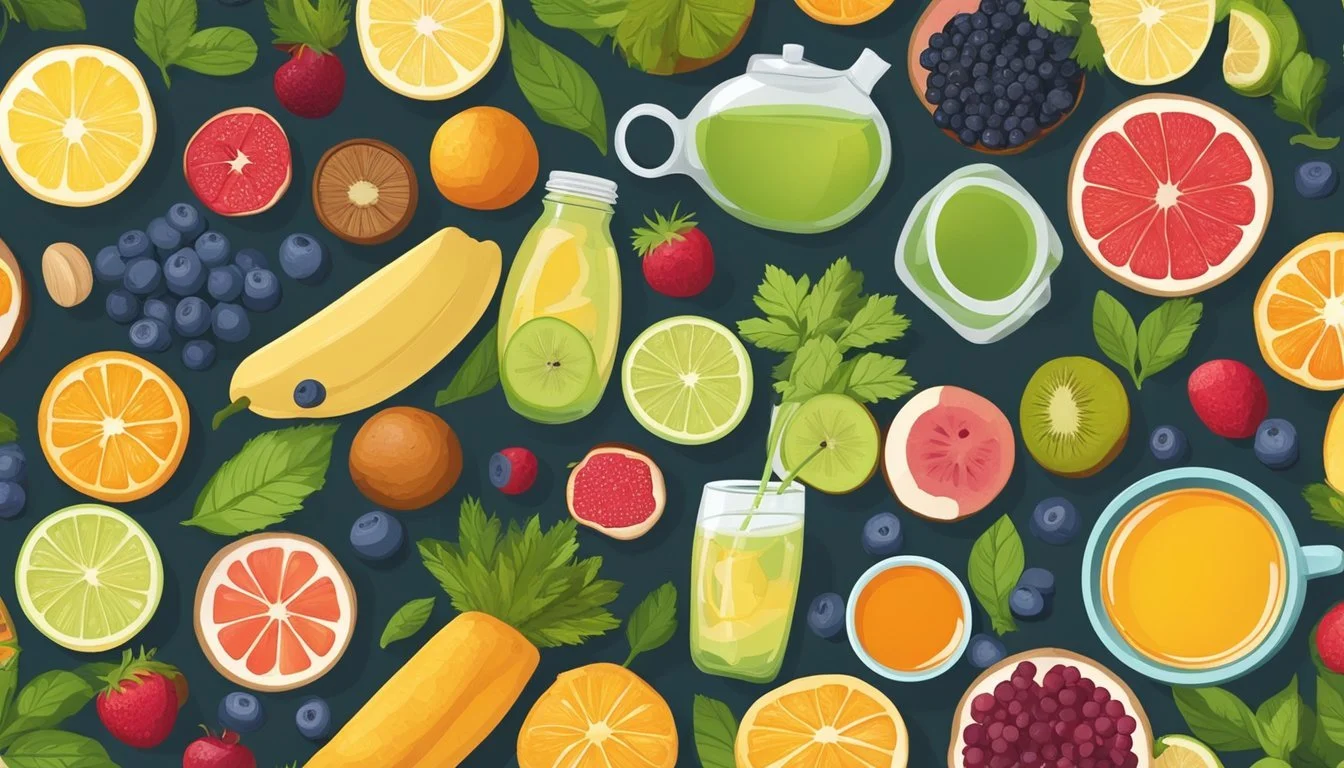How to Enjoy Paleo Diet-Friendly Beverages
Your Guide to Delicious Drink Options
Adhering to a Paleo diet often involves careful consideration of both food and beverage choices. The Paleo principle encourages the consumption of unprocessed items, mirroring the eating habits of our hunter-gatherer ancestors. When it comes to beverages, this means opting for drinks that are free from refined sugars, artificial ingredients, and in many cases, grains. Water is the backbone of Paleo hydration, but there are a variety of other beverages that fit into the Paleo lifestyle, offering both taste and nutritional benefits.
For those seeking variety beyond water, certain types of alcohol like wine and hard cider are generally accepted within the Paleo framework, as they are less dependent on grain fermentation. Similarly, spirits such as tequila are distilled from agave, not grains, making them a preferable choice for some Paleo enthusiasts. Additionally, the popularity of carbonated waters has risen within the Paleo community, with options like club soda, soda water, and seltzer providing a refreshing alternative without added sugar or non-Paleo ingredients.
Tea is another Paleo-friendly option, steeped in history and enjoyed by many cultures around the world for centuries. All types of tea – black, green, white, or herbal – are compatible with the Paleo diet, serving as a source of antioxidants and a diverse range of flavors. Their natural compatibility with the Paleo diet means they can be enjoyed without modification, though a twist of citrus or a sprig of fresh herbs can be added for those who prefer an enhanced flavor profile.
Understanding Paleo Diet Principles
When adopting the Paleo Diet, individuals focus on ancient dietary practices, prioritizing whole foods, lean proteins, and eliminating modern processed items. This section explores the core concepts and guidelines of the Paleo Diet.
Defining Paleo Diet
The Paleo Diet emulates the diet of ancient hunter-gatherer societies. It is based on the principle that humans should consume foods that are genetically compatible with their physiology. The diet encourages eating:
Meats: Preferably grass-fed and free-range sources.
Fruits: A variety of fresh fruits.
Vegetables: Emphasizing leafy greens and root vegetables.
Nuts and Seeds: Except peanuts, which are legumes.
Healthy Fats: Such as those from avocados, olive oil, and coconut oil.
Seafood: Especially those rich in omega-3 fatty acids like salmon.
Benefits of Following Paleo
Individuals may experience benefits such as:
Weight Loss: Often a result of reduced carbohydrate intake and elimination of processed foods.
Improved Heart Health: Due to a focus on lean meat and healthy fats.
Vitamins and Minerals: Supplied by a high intake of fruits and vegetables.
Blood Sugar Regulation: By avoiding refined sugars and grains, blood sugar levels may stabilize.
Reduced Inflammation: Natural diets high in omega-3 fatty acids can help decrease inflammation in the body.
Key Dietary Restrictions
The Paleo Diet imposes several restrictions to maintain its philosophy:
Grains: All forms, including wheat (gluten) and rice, are excluded.
Legumes: Beans, lentils, peanuts, and peas are avoided.
Dairy: Milk, cheese, and other dairy products are not part of the diet.
Processed Foods: Anything that is highly processed or contains additives.
Sugar: Refined sugars and high-sugar foods are to be eliminated.
Participants reduce their intake of carbohydrates, particularly those from grains, which may aid in obesity prevention. They also avoid the potential negatives of dairy and processed foods while embracing a diet rich in whole foods, healthy fats, and vitamins.
Paleo-Friendly Beverage Basics
When adopting a Paleo diet, it's crucial to understand which beverages align with its principles. Focusing on natural, unprocessed options without added sweeteners or artificial ingredients is key.
Essential Beverage Choices
For those on the Paleo diet, the most fundamental drink is water—the ultimate choice for hydration. Beyond this, there are several other suitable beverage options:
Sparkling Water: Ideal for those seeking variety, as long as it is free of added sugars and artificial flavors. Natural mineral waters can also be a refreshing choice.
Tea and Coffee: They should be consumed unsweetened and without any processed creamers. Green, black, oolong, and white teas are all Paleo-approved due to their rich antioxidant content.
Homemade Fruit or Vegetable Juices: When prepared at home, without added sugars, these can be nutrient-rich and flavorful paleo-friendly choices.
Ingredients to Avoid
The Paleo diet emphasizes the avoidance of processed foods and artificial ingredients. When selecting beverages, pay close attention to the ingredient list:
Sugars and Sweeteners: Avoid any beverage with added sugar or sweeteners such as agave or artificial alternatives. This includes soda, fruit juices with added sugars, and energy drinks.
Alcohol: Though not strictly Paleo, if consuming alcohol, opt for organic options and those with the least amount of processing and additives.
Processed Additives: Any drink that contains additives or preservatives falls outside the Paleo spectrum.
By adhering to these guidelines, one can ensure their beverage choices support their Paleo lifestyle.
Alcoholic Beverages on Paleo
When adopting a Paleo diet, one should select alcoholic beverages that align with the principles of consuming unprocessed, grain-free options while prioritizing moderation due to health implications.
Paleo-Compliant Alcoholic Options
Red wine and wine in general are often considered the most Paleo-friendly alcoholic beverages. They are less processed and contain resveratrol, an antioxidant that may help reduce the risk of heart disease. Hard ciders provide a gluten-free option, as they are predominantly made from fermented apples rather than grains.
Red wine: Contains antioxidants and resveratrol.
Hard cider: A gluten-free option, typically made from apples.
Tequila is another acceptable choice, as it is distilled from the agave plant and does not involve grains. Spirits are distilled and contain fewer additives than other alcohols, but they should be consumed in moderation due to their high alcohol content and potential as toxins.
Tequila: Grain-free and derived from agave.
Spirits: Lesser additives, but high in alcohol content.
Moderation and Health Implications
It is crucial to prioritize moderation when consuming alcohol on the Paleo diet. Alcoholic beverages should be seen as an occasional indulgence rather than a staple. Overconsumption can lead to negative health outcomes and may counteract the benefits of a Paleo lifestyle.
Moderation: Limiting consumption is key for maintaining health.
Gluten-free options: Seeking out gluten-free alcoholic options aligns with Paleo guidelines.
While beer is generally discouraged on a Paleo diet due to its gluten content and processing methods, there are gluten-free beers available. However, they often contain alternative grains and should still be treated with caution.
Non-Alcoholic Beverages for the Paleo Dieter
Adhering to the paleo diet doesn't mean one has to sacrifice variety in their beverage choices. The following options provide a plethora of flavors that comply with paleo principles, focusing on natural and unprocessed ingredients.
Herbal and Natural Teas
Herbal teas are an excellent choice for the paleo dieter, offering a wide range of flavors and health benefits without breaking dietary rules. They can be steeped from various parts of plants including leaves, seeds, and roots. Options like chamomile, mint, and ginger tea not only provide soothing effects but also contain beneficial antioxidants. For something more robust, natural teas such as green tea or black tea can be enjoyed, as they are derived from tea leaves and are rich in polyphenols.
Common Ingredients: herbs, berries, citrus peel
Preparation Tips: Steep in hot water for several minutes for full flavor extraction.
Paleo Smoothies and Shakes
Smoothies and shakes are a fantastic way to incorporate fruits, nuts, and seeds into the paleo dieter's regime. A simple recipe might include a combination of almond milk or coconut milk with a blend of fruits like berries and apples. For added nutrition, paleo dieters can toss in a handful of spinach or kale to get a serving of vegetables. Additions like chia seeds or flaxseeds offer a boost of omega-3 fatty acids.
Key Components: Almond milk, coconut milk, fruits, vegetables, seeds
Texture and Taste: Creamy and customizable according to the fruits and additions chosen
Hydration with Water and Infusions
Staying hydrated is crucial, and plain water is the most natural way to do so. For those looking for a bit more flavor or variety, infusions offer a refreshing alternative. The paleo dieter can infuse water with slices of lemon, lime, or orange, or even with cucumber or herbs like mint. Sparkling water also serves as a good substitute for soda, providing the fizz without the added sugar or artificial ingredients.
Infusion Suggestions: Lemon, lime, mint, cucumber
Sparkling Water Tip: Choose plain sparkling water to avoid added sugars or flavors.
Preparing Paleo Beverages at Home
Embracing a Paleo lifestyle extends to what one drinks, with a focus on whole, unprocessed ingredients. This section provides practical guidance to preparing Paleo-friendly beverages in the comfort of one's home.
Simple Recipes and Ideas
When preparing Paleo beverages at home, simplicity is key. One may start with sparkling mineral water as a base for a refreshing drink, adding slices of lemon or lime for a zest of flavor. For a nutrient-rich option, smoothies with a combination of vegetables like kale or spinach and fruits such as berries make a quick and satisfying choice. Paleo practitioners may create homemade nut milks from almonds or cashews by blending soaked nuts with water and straining the mixture.
Tea is another beverage that aligns with Paleo principles, offering a variety of choices like green, black, white, or herbal teas. One should ensure these teas are free from non-Paleo sweeteners or creamers.
Shopping for Paleo Ingredients
Purchasers should prioritize whole, unprocessed ingredients when shopping for Paleo beverages. Here's a basic shopping list:
Nuts and Seeds: almonds, cashews, chia seeds
Oils: coconut oil for richness in smoothies
Vegetables: leafy greens, cucumbers
Sweeteners: honey, maple syrup
Others: tea leaves, coffee beans, spices like cinnamon and nutmeg
It's important to inspect labels for added sugars or non-Paleo preservatives, especially when shopping for packaged items like nut milks or teas.
Using Natural Sweeteners
For those who prefer a touch of sweetness in their beverages, natural sweeteners such as honey and maple syrup can be used in moderation. They provide not only sweetness but also distinct flavors that can enhance a beverage:
Honey: Add a teaspoon to tea or drizzle over fruit in smoothies.
Maple Syrup: Use as a sweetener in homemade nut milk or to create Paleo-compliant sodas when mixed with sparkling water.
By adhering to Paleo guidelines, individuals can still enjoy a range of satisfying beverages. The key is to keep ingredients natural, avoid processed additives, and get creative within the constraints of the diet.
Navigating Social Situations
When attending events, individuals following a Paleo diet can still enjoy the social atmosphere by making smart beverage choices and effectively communicating their dietary preferences.
Choosing Paleo-Friendly Drinks at Events
Those on a Paleo diet should opt for paleo-friendly beverages when alcohol is present at social events. It is important to choose drinks that align with Paleo principles, focusing on moderation and natural ingredients.
Wine is often considered a suitable option, as it is made from fermented grapes and does not contain grains like beer. When selecting wine, one should look for dry varieties with no added sugars. Spirits, such as whiskey, can also be consumed, provided they are not mixed with sugary beverages. Instead, one can use mixers like club soda or fresh citrus juice, and if sweetness is desired, natural options like stevia can be a suitable substitute.
For non-alcoholic choices, herbal tea can be an excellent paleo-friendly beverage, particularly when served without any sweeteners or dairy add-ins. This ensures that individuals maintain their paleo lifestyle even in social settings.
Here's an illustrative list of Paleo-friendly alcoholic beverages:
Wine: Opt for dry wines with no added sugars.
Spirits: Choose clear spirits such as whiskey and mix with Paleo-compliant mixers.
Mixers: Club soda, fresh lemon or lime juice, and stevia for sweetness.
Communicating Dietary Choices
Effective communication about one's dietary choices is pivotal. Individuals should inform hosts or friends of their dietary restrictions beforehand, to ensure they can be appropriately accommodated. This not only shows respect for the host's planning but also ensures that those on a Paleo diet can have a stress-free experience in social situations.
One can follow these tips for smooth communication:
Be clear about what beverages are acceptable on the Paleo diet.
Express appreciation when hosts accommodate your choices.
Offer to bring a drink that fits your Paleo diet to share with others.
By utilizing clear and straightforward communication regarding their dietary needs, individuals can still partake in the social aspects of an event while staying true to their Paleo lifestyle.
Health Considerations and Nutritional Advice
Before indulging in Paleo diet-friendly beverages, it is crucial to understand their health implications and nutritional values to ensure they align with personal health goals and dietary needs.
Consulting with Health Professionals
Individuals should consult with health professionals, such as a registered dietitian, before making significant changes to their diet. A professional can provide tailored advice that considers an individual’s health history, current condition, and specific nutritional requirements. This step is especially important for individuals with medical concerns like heart health or blood sugar regulation, as certain Paleo-friendly beverages may influence these conditions.
Understanding Nutritional Content
Paleo diet-friendly beverages should be evaluated for their nutritional content to ensure they contribute to an individual's nutrient intake positively. These drinks should ideally contain vitamins, minerals, and antioxidants that support overall health. When considering energy and weight management, selecting beverages that do not cause a spike in blood sugar is vital. They should also aid in satiety and could potentially help to burn fat when complemented with an active lifestyle. Beverages that are protein-rich can further assist with muscle maintenance and repair. Here’s a snapshot of the nutrients to look for:
Proteins: Aids in tissue repair and provides energy.
Antioxidants: Supports cell protection against oxidative stress.
Minerals: Essential for a variety of biochemical processes in the body.
Choosing beverages that align with the Paleo principle involves opting for natural and unprocessed options while being mindful of their impact on one’s health.
Remember:
Consult a registered dietitian: They can provide personalized advice that aligns with your Paleo diet.
Evaluate nutritional content: Look for beverages rich in proteins, minerals, and antioxidants for overall wellbeing.
Lifestyle Integration
Adopting Paleo-friendly beverages is not just about selection but also about how one can maintain this choice consistently and enjoyably within their lifestyle.
Long-Term Adherence to Paleo Beverages
For those considering a Paleo diet, understanding the hunter-gatherer ethos is key. It emphasizes consuming what could be hunted or gathered before the advent of agriculture. This core principle should guide beverage choices, favoring water, both still and sparkling, and herbal teas. Nutrition is paramount in the Paleo lifestyle, and drinks are no exception.
Water (Still/Sparkling): Ensures hydration without deviating from diet principles.
Herbal Teas: Offers variety and potential health benefits.
Applying moderation in the consumption of other beverages aligns with dietary balance. Coffee, unsweetened teas, and homemade juices, while acceptable, should complement a diet rich in whole foods. To remain true to a Paleo diet plan:
Select beverages that adhere to Paleo guidelines.
Prioritize hydration with pure water.
Incorporate variety through allowed teas and occasional homemade juices.
It's important to stay informed on the evolving understanding of what's acceptable within the Paleo framework, for instance, by looking for endorsed certifications like TRUEPALEO™ and PaleoFLEX™.
Balancing Diet and Enjoyment
Enjoyment of a diet is crucial for its long-term success. Beverages form an integral part of the social fabric and personal enjoyment. For adherents to the Paleo diet, there are ways to integrate permissible drinks without compromising the diet's principles.
Social Settings: Choose sparkling water with a twist of lemon or lime to replace soda.
Daily Routine: Start the day with black coffee or herbal tea; refresh with infused waters.
Tips for enjoying Paleo-compliant beverages include using natural flavors such as citrus or mint to enhance plain water and experimenting with herbal tea blends. By diversifying beverage options within the constraints of the Paleo diet, individuals can enjoy the benefits of the diet without feeling deprived. The key is to make choices that support both health and pleasure without reverting to pre-agricultural times.
FAQs about Paleo Beverages
Navigating the world of Paleo beverages can be simple when you understand which drinks fit the Paleo framework and how to address common misconceptions.
Commonly Asked Questions
Can I drink carbonated water on a Paleo diet? Yes, plain carbonated water like seltzer, soda water, and club soda are Paleo-friendly. Adding a twist of lemon, lime, or orange can enhance flavor without adding sugars.
Are there any Paleo-friendly alcoholic beverages? Hard ciders, certain wines, and spirits like tequila that do not rely on grains are considered more Paleo-friendly. Always check for added sugars which are not Paleo-compliant.
What should I look for in Paleo beverages? Beverages should ideally be organic, gluten-free, and without added sugars, sweeteners, or artificial ingredients. Natural drinks that are free from dairy, grains, legumes, corn, soy, and vegetable oils align with the Paleo diet.
Is tea allowed on the Paleo diet? Yes, plain herbal and traditional teas without added sweeteners are suitable for a Paleo diet.
Myths and Misunderstandings
Myth: All dairy products are prohibited. Clarification: While the Paleo diet generally excludes dairy, some individuals may choose to include grass-fed, organic, and raw dairy if they tolerate it well.
Myth: The Paleo diet is similar to the Keto diet. Clarification: While both diets emphasize low-carb intake, the Paleo diet is not specifically designed for ketosis and has a different focus, such as the inclusion of certain fruits and veggies that may be restricted on keto.
Myth: Sweeteners like honey are always Paleo. Clarification: Although honey is a natural sweetener, it should be consumed in moderation on the Paleo diet due to its sugar content.
Myth: You can't have any carbs on Paleo. Clarification: Paleo-friendly carbs are available in the form of veggies, fruits, and certain tubers like sweet potatoes, unlike grains, rice, oats, cereal, and white potatoes which are excluded.







